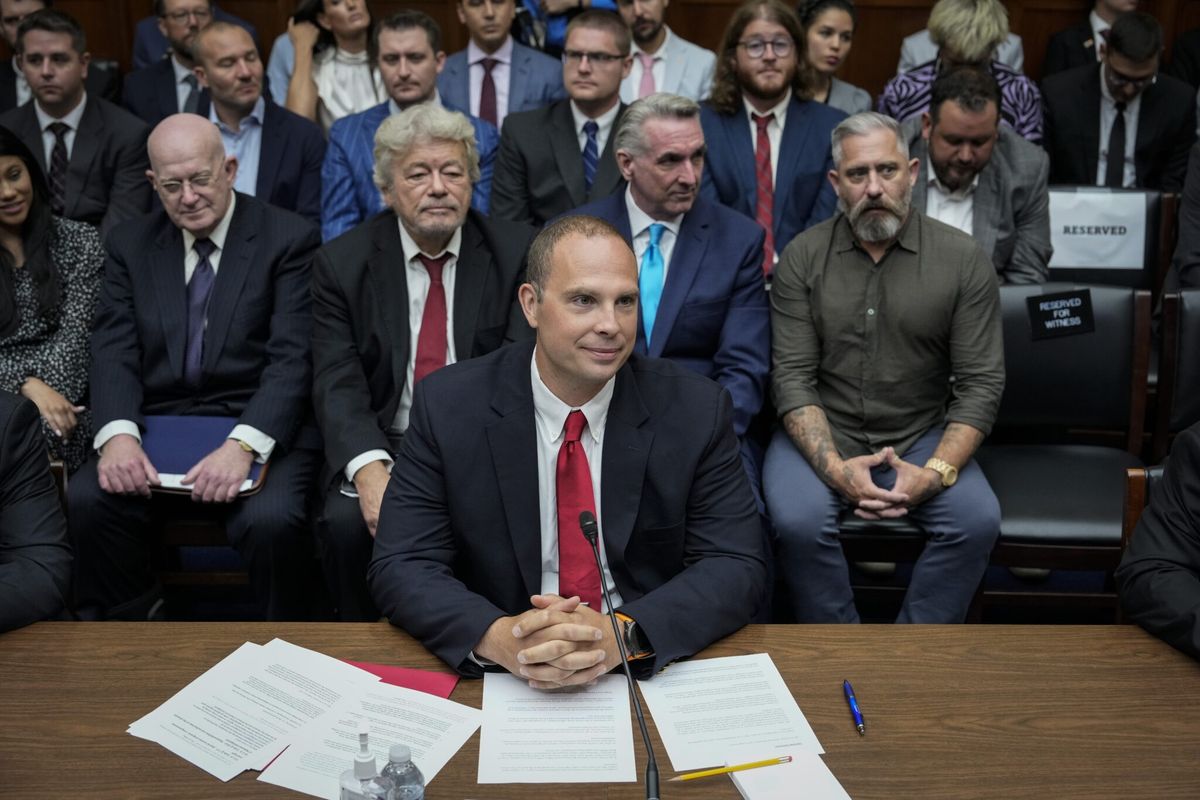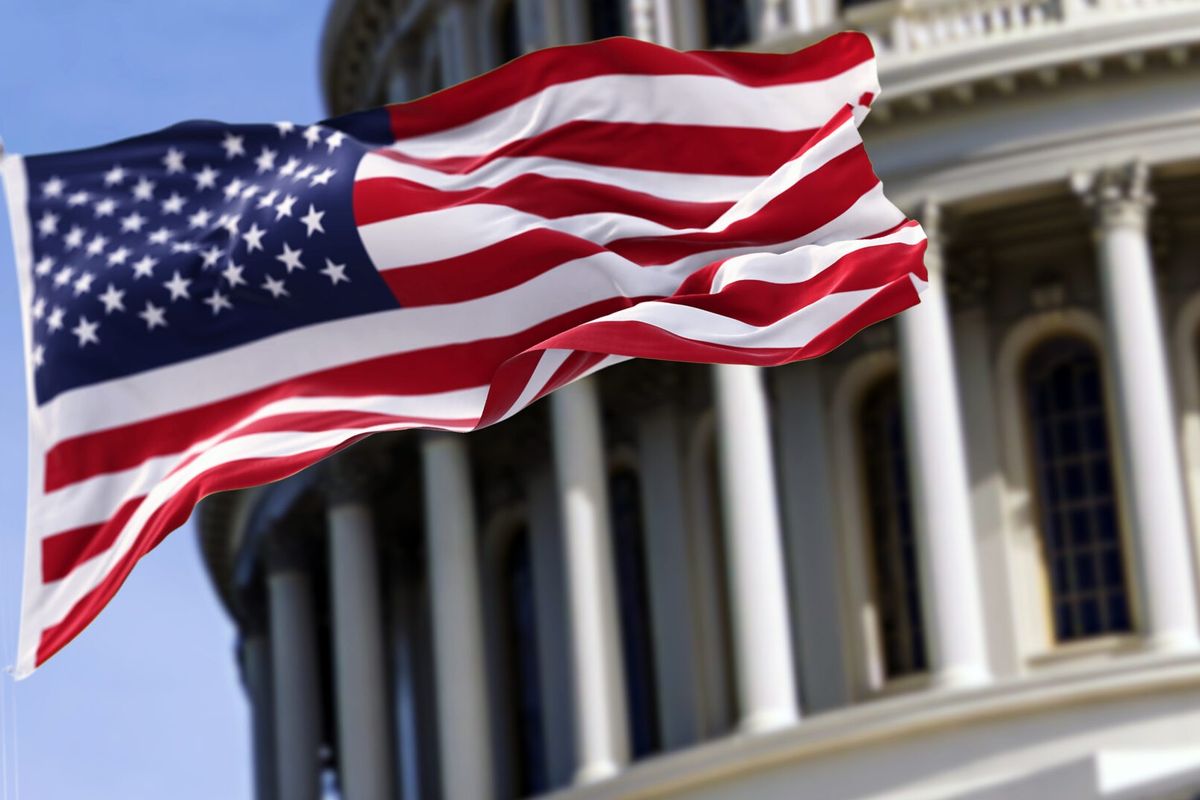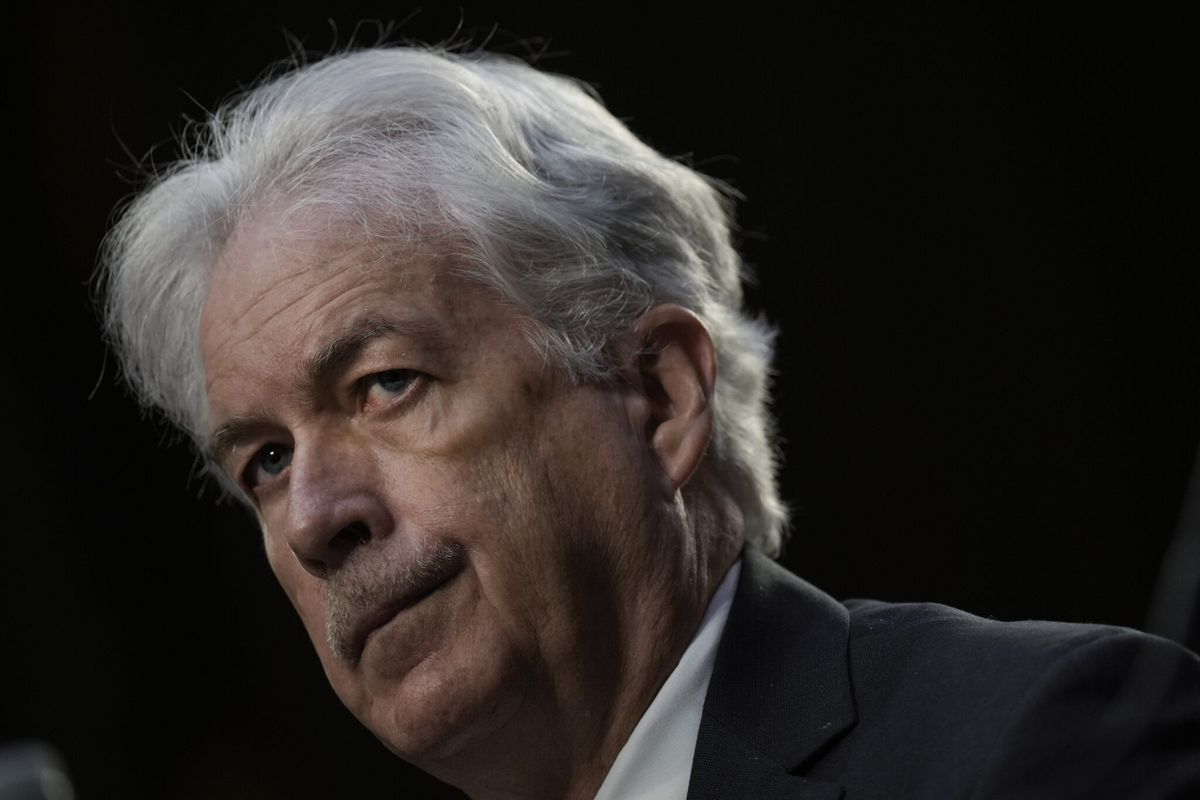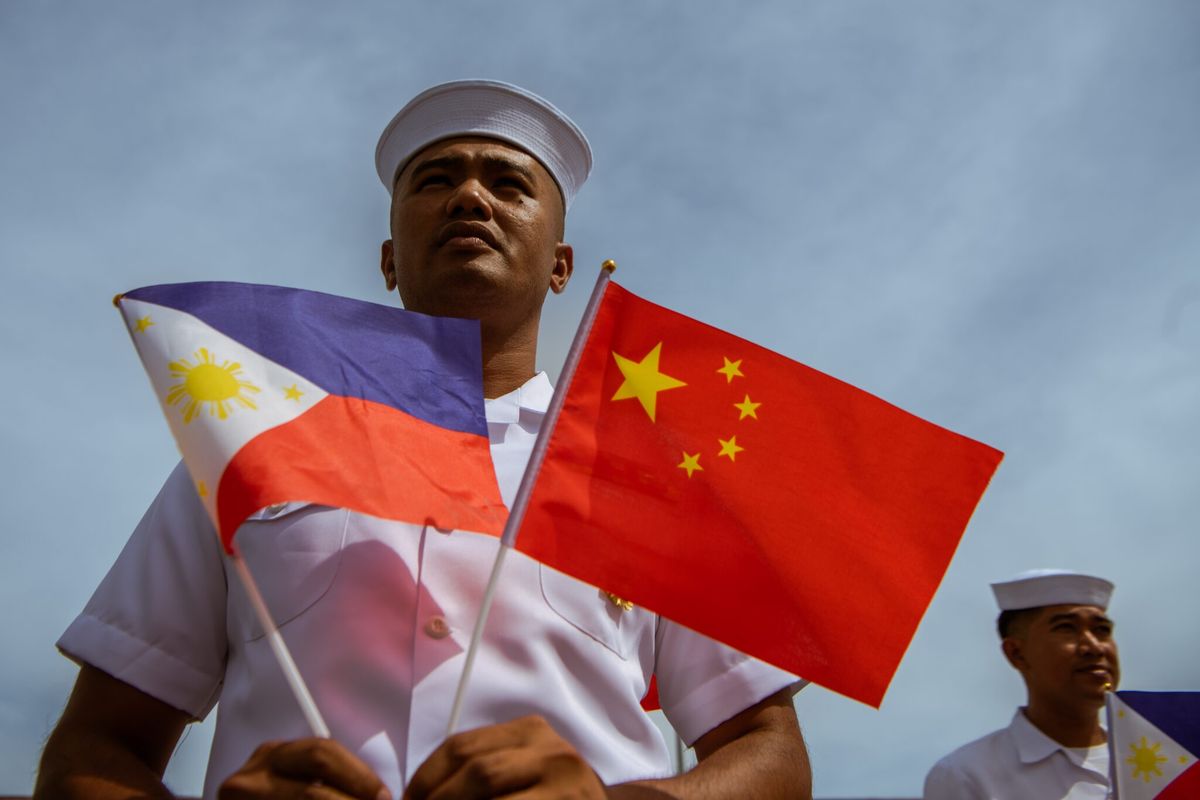SUBSCRIBER+EXCLUSIVE INTERVIEW – On the eve of a widely predicted Ukrainian offensive along a 900-mile front that includes a bevy of fixed Russian positions, the very nature of what is at stake for both Kyiv and its western allies is clear. The conflict, brought on by Moscow’s invasion of Ukraine last year, is not so much a regional war, security experts say, but rather a “regional war in the dimension of … [a] global conflict.” That's what Cipher Brief Expert and retired four-star Gen. John Allen, former Commander of the NATO International Security Assistance Force in Afghanistan, told Subscriber+Members during last week's exclusive briefing. Allen detailed Russian tactics, broader implications of the war, new battlefield paradigms in both hybrid warfare and public-private partnerships, and the role of an increasingly-involved China.
The message Allen sought to convey both underlines the perils of a potential defeat, and the ripple effects that it could have for both the U.S. and its European allies. “Ukrainians are fighting and dying on the battlefield for their independence, for their very survival,” he said. “But in many respects, their sacrifices are our sacrifices.”
Gen. John R. Allen (Ret.), Former Commander of the NATO International Security Assistance Force in Afghanistan
John R. Allen is a retired U.S. Marine Corps four-star general and former commander of the NATO International Security Assistance Force in Afghanistan. Immediately following his retirement from the military, Allen served as the Senior Advisor to the Secretary of Defense on Middle East Security. In that role, he led the security dialogue with Israel and the Palestinian Authority for 15 months within the Middle East peace process. At the request of President Obama, Allen subsequently served as Special Presidential Envoy to the Global Coalition to Counter ISIL, growing the international coalition to 65 members in the face of the onslaught of the so-called Islamic State.
2023 TIMELINE:
- Feb. 24: The Biden Administration announces additional security assistance to Ukraine, totaling $2 billion, which includes additional unmanned aerial systems and counter-UAS, as well as electronic warfare detection equipment and ammunition.
- March 21: The Pentagon pledges 31 M1A1 Abrams from refurbished hulls in U.S. inventory, as well as artillery ammunition.
- March 24: Russian President Vladimir Putin and Chinese President Xi Jinping pledge “friendship” following a Kremlin summit.
- April 4: Finland becomes NATO's newest member, after sending its accession documents to the North Atlantic Treaty at NATO Headquarters.
- April 19: The Pentagon pledges more assistance for Ukraine, including ammunition for U.S.-provided HIMARS, artillery rounds, and anti-armor capabilities, valued at roughly $325 million.
- April 26: Chinese President Xi Jinping speaks with Ukrainian President Volodymyr Zelenskyy for first time since Russia’s invasion of Ukraine.
- May 3: The Pentagon pledges more security assistance to Ukraine, the 37th such assistance package since Russia’s invasion last year, which includes ammunition for U.S.-provided HIMARS, additional howitzers, artillery and mortar rounds, as well as anti-armor capabilities.
- May 3: Footage of two drones allegedly targeting the Kremlin, and being shot down, is released. Tit-for-tat accusations are exchanged between the Kremlin and western leaders about the nature and target of the attack.
- May 7: Russia's Wagner Group abandons plans to withdraw from Bakhmut, as fighting rages in the embattled eastern Ukrainian city.
The Cipher Brief spoke with Gen. John Allen (Ret.), former Commander of the NATO International Security Assistance Force in Afghanistan, for an exclusive briefing with Subscriber+Members about the on-going war in Ukraine. This transcript has been lightly edited for length and clarity.
The Cipher Brief: You have very passionate feelings about what is at stake in Ukraine with the war and the outcome of this war. Can you frame up what's happening there and what's at stake in your own words?
Gen. John Allen: It's always important for me at the beginning of a conversation about Ukraine to remember where we were a little over a year ago. I worry that as time has passed, there has been a drift towards a normalization. I used this term when we were in Iraq almost every day on the news. It seemed as though the American public was being dipped in blood, and it just became a normal dimension of the reporting every single day. It's really important that we remember what has happened in the last 15 months or so and that we not permit this conflict to become normalized for a whole variety of reasons. First, it's important to remember that it is no less a goal of Vladimir Putin to eliminate Ukraine as a distinct national entity and to eliminate the identity of the Ukrainian people. Now, that's pretty big and is pretty substantial. With that as a going-in position, he ultimately would attack Ukraine on the 24th of February last year, and his intent was to destroy the government. His intent was to sweep aside the military. He sought the collapse of the government in Kyiv. Well, we don't know exactly what his intentions were.
It was to incorporate probably Ukraine into this concept, this greater Russia concept that were sitting unfold in conversations with Belarus in Minsk. It's really important that we understand that having failed in his initial attacks on Ukraine in the year 2023 in Europe, in the heart of Europe, we're witnessing the systematic bombing of cities and civilian centers. We're witnessing the systematic employment of rape and the execution of civilians in occupied areas, the abduction of Ukrainian children being sent to Russia for who knows what reason ultimately to be crucified perhaps. In the year 2023, these are pretty heinous crimes.
I just want to make sure we have a common understanding of where we're starting this conversation. Putin already [faces an arrest warrant from International Criminal Court], and that's solely for the fact of the abduction of Ukrainian children. My guess is that there will be more. And my hope is that there will be more Russian officials who will also be similarly indicted … and arrest warrants [will] be issued.
There has to be in the future, a significant number of the Russian leadership who participated both in the crafting and the execution of this war, an understanding that they're going to be held accountable, the leader's going to be held accountable, his inner circle, they're going to be held accountable, his oligarchs are going to be held accountable and his military leadership. Russia and China blame the United States for all of this … a collision between the expansion of NATO on the one hand as a philosophical approach to the alliance versus the genetic predisposition of Russian leaders to protect their near abroad.
That collision is what we see in many respects playing out in Ukraine. It was of course that desire by Vladimir Putin to control Ukraine, whether it remained a distinct national entity or was absorbed into a greater Russia that he intended ultimately to wage this war. It's really important that we understand that. For me, the bottom line is this: [This] is not a regional conflict. Lots of folks will attempt to portray this as a regional conflict. This is a global conflict … we're witnessing a regional war in the dimension of this global conflict. Ukrainians are fighting and dying on the battlefield for their independence, for their very survival, but in many respects, their sacrifices are our sacrifices.
As long as we have seen and we have seen it in February of 2022, when the Russians and the Chinese fundamentally in their joint statement redefined their intent to remake the world order, we should not be surprised at this kind of an action. The war in Ukraine is going to be something that we'll see in the future.
It's really important that as we embark on this conversation … we remember how it started, how it's being prosecuted against a country that did not threaten Russian security, a peaceful country struggling to be a functioning democracy and the tens of thousands of Ukrainians who've been killed, the civilians in particular, the tens of thousands and millions now who are either internally displaced or are refugees across the border into the NATO countries in particular.
I would like to single out Poland for its incredible compassion and generosity for accepting so many Ukrainians. We cannot permit this conversation to be normalized. We have to come at it from a standpoint of the horror of the Russian actions and how we are going to try to redress this, not just because it's a war in Ukraine, but because this is really the harbinger of a global conflict.
The Cipher Brief hosts expert-level briefings on national security issues for Subscriber+Members that help provide context around today’s national security issues and what they mean for business. Upgrade your status to Subscriber+ today.
The Cipher Brief: Are you concerned about how support for Ukraine might be impacted by an upcoming U.S. election and how the war may become a political football?
Gen. John Allen: It can be. I'm not really worried about that yet. One of the ways of keeping it front and center … [is not only in the context of a] global leadership role, but also in our obligation to the Ukrainian people. By going back to this issue about the potential for the normalization of this conflict and what really is at stake, to spell that out regularly is important to neutralize the fringe elements on both sides of the aisle that might either seek to eliminate an American presence or to reduce an American presence where the outcome of the conflict could seriously be in jeopardy.
We also have to help some of our European partners understand that we have to be very careful about what we're saying politically in this matter. Again, American leadership has been extraordinary in bringing together this... It's larger than NATO and the EU. It's an ad hoc global coalition and bringing together this coalition. We're going to be careful about inadvertently saying things that may either cause the coalition to begin to fray at the edges or create internal political problems in some of our key partners in this conflict, that could have the effect of reducing support for Ukraine over time. We don't want this to become a political issue. The obvious reason for why we're supporting this conflict is there. Putting it in the right context, all of our leaders, regardless of political persuasion, can understand the stakes that are involved here if we fail to properly support the Ukrainian people. It's not just about Ukraine, it certainly is, but it's not just about Ukraine. This is about American leadership and it's about the global conflict that we're now facing.
The Cipher Brief: How important do you think this new public-private sector alliance has been in Ukraine, and is this a trend we're going to continue to see in future conflicts?
Gen. John Allen: It's a trend we're going to see for the future … You talk about new or novel alliances and groupings, and one of the things that has really been very interesting has been just as you described it, the emergence of the private sector. There is an organization at Georgetown University called the Center for Security and Emerging Technologies, CSAT. I would suggest that they've just published a report on that very issue … There was a very interesting round table that they convened. Full transparency, I was an attendant, which brought in representatives from the private sector. We had a long conversation about first, what the private sector did initially in this conflict and what the potential is over the long term for the private sector to have a role like this in the past. Let me just start in the short term. There were some really remarkable contributions that were made while the United States and our allies were seeking to gather together the material, et cetera, to get into the Ukrainian hands pretty quickly.
Private sector elements really on their own with the approval of the United States, but not in a contractual relationship, began to help the Ukrainians out in some really significant ways. [Starlink] is one of the obvious … the Elon Musk orbital constellation that preserved the capacity for the Ukrainians both to remain on the internet and to communicate in the dire earliest moments of this conflict. Microsoft, again, full transparency, I'm a strategic advisor to Microsoft. Just by coincidence, Microsoft had finished the migration of most of Ukraine's data into the cloud. It should have been no surprise that some of the initial missile barrages tried to take out the data centers in Ukraine.
Other companies did enormously important work, much of it in the digital environment, much of it in the software environment, much of it in the cyber defense environment. Then we had elements of the private sector who provided on-the-ground civilian contractors who provided really important early support to the Ukrainians in the context of advice on the employment of some of the early weapon systems that we're getting into the battle space. This is not new. I mean the private sector has played in warfare before, but we haven't seen the deployment, the expeditionary deployment like this in a conflict before. We're going to see it in the future. The question really isn't whether that's going to happen or not. One of the reasons that they were able to get in and provide these kinds of support efforts to the Ukrainians was because they can move so fast. They don't move at the speed of government. Speed of government is just too slow for this kind of conflict. The speed of government is just too slow often in dealing with the speed of late, which is the environment within which cyber and information. Weapons systems and influence operations are being waived. Here, we had some enormously capable American private sector organizations that had either longer term relationships with Ukraine or established very short term relationships with Ukraine, very quickly emerged into the conflict environment, emerged in the conflict of the war itself, and began to provide force multiplying capabilities of Ukraine.
We should encourage this. My hope is and I know that you are very interested in the Cipher Brief is in general very interested in the lessons learned that we're going to take away from this war and more broadly in the conflict. We should be encouraging every possible way in the aftermath of the kinetic operations once it comes to a closed or even now, to figure how we will ultimately create the relationship between the private sector and the Department of Defense or the US government at large or our allied governments, so that we don't end up having this gap in capabilities or a break in the quick deployment of the private sector providing really essential battlefield support to the Ukrainians while the rest of the governmental entities are trying to spin up to speed to get equipment in.
My point is private sector had a very important early role. It's still playing a role. We should be working hard to do what we can, and I know this is happening. It's just whether it can happen fast enough to create the private-public relationship that can optimize the capacity for the private sector to operate in the cyber information software domain while the governments are providing hardware to the Ukrainians to fight in the physical domain.
Looking for a way to get ahead of the week in cyber and tech? Sign up for the Cyber Initiatives Group Sunday newsletter to quickly get up to speed on the biggest cyber and tech headlines and be ready for the week ahead. Sign up today.
The Cipher Brief: We've seen Chinese President Xi Jinping visiting Moscow recently, meeting with Russian President Vladimir Putin, and it was very clear that the two have a very close relationship. There's been speculation and some talk based on more than speculation, about the strengthening of that relationship and China's ability to be a credible player when it comes to being a peace negotiator in this conflict. What do you think this alliance means for the war in Ukraine and beyond?
Gen. John Allen: I would refer to your audience to the 4 February 2022 joint statement between Putin and Xi signed in Beijing. That is a very important document. It's really nothing less than a manifesto between the Russians and the Chinese to pool their assets really, to reorder the global rules-based order, which in many respects was authored by the United States and our allies over a period of the post-World War II era, the Cold War era, the post-Cold War era. In doing so, they use many of the terms we're familiar with. They talk about democracy, they talk about human rights, they talk about respecting territorial integrity, the sovereignty of other countries. They apply some of their code words to it that in essence qualify their commitment to human rights because of the local conditions that must be considered. They talk about a relationship that knows no limits and where anything is possible. These are lifts right out of that statement. It also talks about some really important issues with respect to the relationship with the international organizations, the UN in particular.
When we find that we are abandoning our relationships inside the UN, Human Rights Commission and other organizations like that, guess who fills in as quickly as they possibly can into those organizations and tries to achieve leadership? That's the Chinese or the Russians. Russians are problematic now, but the Chinese aren't. They want to see and want to employ these international organizations to achieve their objectives over the long term. Also, there's a commitment by the Russians and the Chinese to deepen and expand their cooperation on artificial intelligence.
You don't have to turn any television or radio on or open any magazine in this country for more than about 15 seconds to see that we are focused enormously on the role of artificial intelligence and what it really means ultimately for our system of ethics, our system of laws, and the societal impact of artificial intelligence. We know where the Russians and the Chinese are going to take artificial intelligence. The Chinese have used it to become the greatest surveillance society on the planet.
You almost can't click a bank statement, you can't drive your car, you can't go to the movies, you can't buy anything where you use a credit card, where the enormity of the data and the power of their computing capabilities isn't sucked up by the algorithms to ensure that they understand who you are, where you are, and what you're doing. When we see in this manifesto, the Russians and the Chinese intending to deepen their relationship on these emerging technologies, we should be very concerned, because who's going to set the behavioral standards if we don't? We've got to do that or our interest will be deeply circumscribed. The other thing they want to do is to dominate internet government.
That was the February of 2022 state joint statement, and I just had one in March when Xi visited Moscow. We were all pretty concerned and pretty watchful about what would come out of that. Our concerns of course were that the Chinese would commit themselves to some form of military support too to Russia. We have not seen that yet. We don't think right now it's in the near future.
The Chinese have a lot to lose with respect to their bilateral and global relations with the democracies and the advanced economies and democracies by providing military support to the Russians, but they are providing support to the Russians and creating a larger market for Russian energy, deepening economic ties to lessen the blow of the sanctioned regimes that have been leveled against the Russians. But very importantly, they also emerge from those couple of days in Moscow with Xi and Putin reaffirming the depth of their relationship. We should expect that that's going to occur, going to continue to occur in the future.
It's something we need to be very attentive to, because again, while I gave you some comments at the beginning about the normalization of the conversation about Ukraine, we have to understand what it is that the Russians and the Chinese have pledged to do, which for all intents and purposes, is to take on the rules-based global liberal order that was authored by the United States and our allies based on our shared common interest for humanity, to take that on and to refashion that after their interests and their ideologies. That's a real issue and we've got to remain attentive to that, keep our eyes on it.
The Cipher Brief: Ukrainian President Volodymyr Zelensky has repeatedly asked for Ukraine to be fast-tracked into NATO membership and yet NATO has refused until the war in Ukraine has resolved. What's your take on what that means for both Ukraine and for NATO?
Gen. John Allen: Let's go back again to one of the intentions of Vladimir Putin when he invaded Ukraine. First, he wanted to eliminate the potential presence of, for intent and purposes, a Western combat outpost right up against the Russian border or the Russian near abroad with the Belarus. He also intended to upend the European security architecture. In so doing, if he had been successful in the early days of the war in February and March of 2022, the outcome could easily have been had he been successful... I just want to make sure we're clear. He wasn't for all kinds of his own reasons. It would've shaken the sense of NATO solidarity.
This would had an effect on the sense of European security, but also, it might have had an effect in the context of separating the United States from our European partners because of the new environment within which Ukraine would be occupied Russia right up on the NATO border and what would be next. That was one of his intentions. The issue, if you recall, was or today is, "When or how will Ukraine join NATO?" We've seen the Secretary General Jens Stoltenberg, who's done a fantastic job as a Secretary General during his tenure across multiple real crises. He's been pretty clear of late that ultimately Ukraine is going to be invited to join NATO. The how and the when will be further explored at the Vilnius NATO Summit coming up in July of this year.
Of course, while President Zelensky wants to expedite membership in NATO, we still have this thing called the membership action plan that needs to be fulfilled. It could of course be fast tracked should the NATO leadership at the summit build consensus that they want to do that, but my guess is it's going to take a while. We will see a NATO invitation to Ukraine to join, but it's just not going to happen in the near future. How soon it occurs and in what form it occurs remains to be determined. We'll see a lot of that emerge from the Vilnius Summit.
It's not just for the President anymore. Are you getting your daily national security briefing? Subscriber+Members have exclusive access to the Open Source Collection Daily Brief, keeping you up to date on global events impacting national security. It pays to be a Subscriber+Member.
The Cipher Brief: What do you believe are some of the most important new alliances that have formed as a result of the war in Ukraine?
Gen. John Allen: Let me inventory some of the old alliances. We have seen a reinvigoration of NATO in many respects. I've been dealing with or serving in NATO for many years all the way back to the breakup of Yugoslavia and the Bosnian conflict. We've seen NATO going through phases over those years where they were more or less well organized or oriented on the kinds of organizational approaches and military prowess that we would all want to have seen NATO displayed during the Cold War.
That has ebbed and flowed, and probably it was at perhaps Nader during the Afghan War, but in the aftermath of this, the invasion of Crimea by the Russians in '14 and now the increased Russian activity around Ukraine and then of course the Ukraine war, we have seen NATO begin to move back towards what we're used to seeing NATO in the context of the Cold War, a more vibrant command structure with Chris Cavoli leading it as a great SACEUR with the kinds of command prerogatives that have been delegated to him by the North Atlantic Council that are very, very important for the war fighting capabilities of the organization.
We're seeing the deployment to the East of very robust war fighting elements of the NATO structure and we're seeing efforts within NATO itself to very importantly organize itself in terms of its transportation networks and its capacity to move to the sound of the guns. We're really seeing NATO reinvigorated. First, I'd have to say NATO is back in many ways. We have also seen, of course, the Russians reinvigorate their own CSTO, Collective Security Treaty Organization. A lot of folks are unfamiliar with this, but they have had to get control of their near abroad as the war in Ukraine has unfolded.
It's worth remembering that in the summer of 2020 there was widespread public unrest in Minsk, in Belarus, and it took Russian intervention to stop something that had occurred, a color revolution that had occurred in Ukraine from occurring in that year in Belarus. Just before the Russians invaded in February of 2022, there was an outbreak of public unrest substantial in Kazakhstan, which again required the CSTO and Russian troops to put that process down. What we have seen is that the Russians are going to ensure that the rest of elements of the near abroad are maintained under control of this so-called CSTO.
We've seen the Chinese reinvigorate the Shanghai Cooperation Organization, the SCO, which they had authored a number of years ago, and the membership has been increasing. We're seeing that the Chinese will increasingly use the Shanghai Cooperation Organization, SCO, as a platform for its information and influence operations going forward. We've also seen an interesting emergence of what I would call a non-aligned movement. It's not being led by India, but India has been very interesting in its alignment during this conflict. It has retained its relationship with Russia, although it has scolded Putin for the war. While we Americans and our allies point to some large number of countries, it's about 43 or so, which is NATO plus other countries in the so-called Global West.
While there are about 43 of those countries that are involved in the coalition, there are at least 100 who aren't. There are at least 100 countries around the world who are not interested in committing themselves one way or the other against Russia in this particular conflict. Now, they certainly have views about Russian violation of the territorial integrity and sovereignty of Ukraine for fear that somebody else might want to do that if the Russians ultimately are able to get away with this normalization issue. But a large number of countries in the global south that had relationships both with the Russians and by extension the Chinese have preserved those relationships even through the horrendous conduct of this war by the Russians.
We've seen a strengthen NATO. We have seen the Russians bear down hard on the near broad states within the CSTO. We've seen the Chinese attempt to invigorate the Shanghai Cooperation Organization. India, which is an extraordinarily important country in the world today, has chosen not to take side on this issue, even though interestingly, India is part of the quad in the Indo-Pacific Region where India and the United States and Japan and Australia have a very close relationship with very clear security connotations to it. Then again, in the global south, many of the countries in South America and in Africa and in Southeast Asia have chosen not to take a side here.
There is by no means unanimity in the nation states of the world that Russia is the culprit or the outlaw here. Many of them are willing to stand on the sidelines and let the Russians do what they're doing because they have relations or anticipate relations in the outcome.
The Cipher Brief is committed to publishing a range of perspectives on national security issues from deeply experienced national security professionals.
Opinions expressed are those of the author and do not represent the views or opinions of The Cipher Brief.
Read more expert-driven national security insights, perspectives and analysis in The Cipher Brief because National Security is Everyone’s Business














